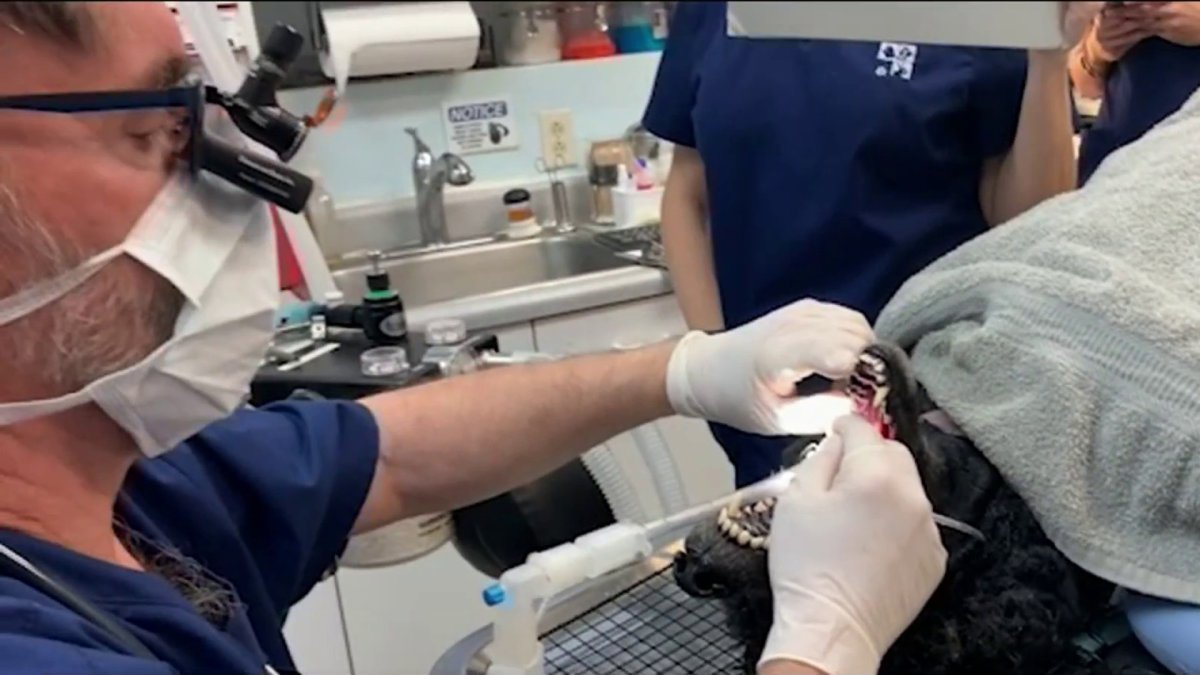Chew on This: Pets Need Dental Care Too - NBC 6 South Florida

Most Americans are aware of the importance of routine dental cleanings to their own overall health, but for many, it comes as a surprise to learn that the same holds true for our pets.
The American Dental Association warns tooth and gum disease can lead to a host of problems in humans, including, but not limited to cardiovascular disease, stroke, bacterial pneumonia, and other systemic health problems. Similarly, our canine and feline counterparts often suffer from congestive heart failure, kidney, and liver disease when dental disease goes untreated.
The first step towards protecting our pets from the dangers of dental disease is to take steps to minimize it, or better yet, prevent it entirely. Preventative care starts at home and should begin from the first day we bring our pets into our lives. Our dachshund gets his teeth brushed daily. This requires a small-sized toothbrush (we use the sizes made for children), and toothpaste that has been specially formulated for pets. Never use human toothpaste, as it is meant to be spat out, and our pets cannot spit. Additionally, some toothpastes contain xylitol, an artificial sweetener that can be fatal to our pets if they ingest it. Be sure to look for an enzymatic toothpaste, as this will reduce the need for rigorous scrubbing. The enzymes digest plaque bacteria on the surfaces of teeth and gums, so even pets who will not tolerate brushing will benefit from having a dollop of toothpaste spread along the gumline. Pet-specific toothpaste often contains food-based products pets tend to find palatable, so for most pet parents, this particular aspect of dental care is not a challenge.
For those of us whose pets don't follow the norm, dental cleaning wipes can be used to remove food debris and prevent the buildup of tartar. For pets who are head shy or prone to biting, a water additive can be used as part of a daily dental care protocol.
Perhaps the most important aspect of pet dental health care is a regular dental examination by your veterinarian . Your veterinarian will be able to spot problems that are not obvious to the untrained eye. When signs of dental disease are detected, your veterinarian will recommend professional teeth cleaning.
Traditionally, professional teeth cleaning consisted of thorough descaling and polishing, followed by a more thorough dental exam. It is now the standard of care to add dental radiology, or x-rays, to the treatment plan.
When looking at a pet's teeth, it helps to think of them as icebergs. Only about a quarter of each tooth is visible, while the rest lives beneath the gum line, invisible to the naked eye. Most dental disease lies well beneath the surface, and failure to look using x-rays can cause our pets to come home from a dental cleaning with unresolved dental problems. These problems can lead to a whole host of painful conditions that can threaten our pet's long-term health, and affect their quality of life - after we've spent money.
A comprehensive dental cleaning delivers far more than fresh breath and pearly whites. It is a vital tool for identifying sources of infection and disease to prevent suffering in both the short and long term.
If your pet has a dental problem that is beyond a general practitioner's area of expertise, you may be advised to schedule an appointment with a board-certified veterinary dental specialist . These caring professionals can help pets needing complex solutions such as root canals, bondings, and crowns. But before Fluffy gets to that point, ask your veterinary team for advice on how to maintain dental health at home, and schedule an appointment for a dental examination with your pet's veterinarian.
Dr. Kupkee is the medical director at Sabal Chase Animal Clinic.

Comments
Post a Comment